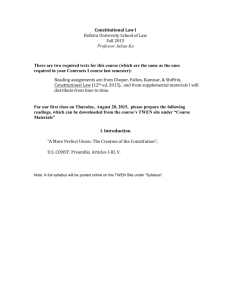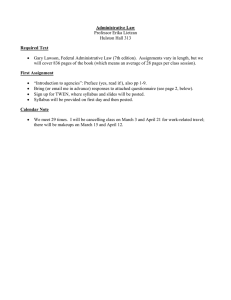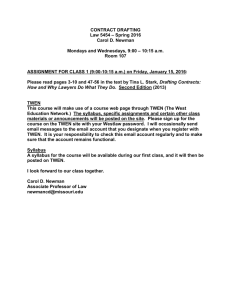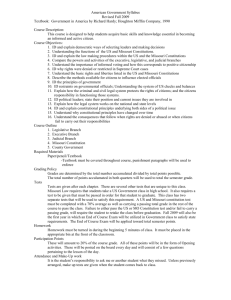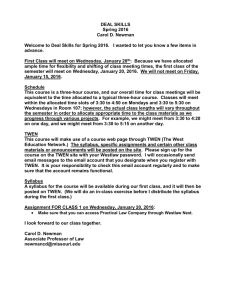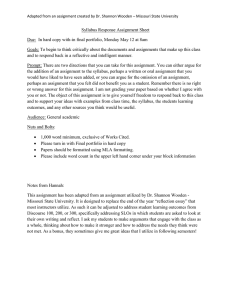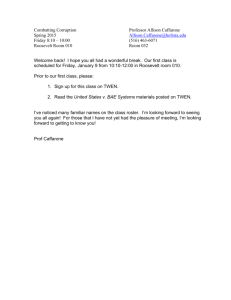Professor Richard C. Reuben Constitutional and Civil Rights Litigation
advertisement
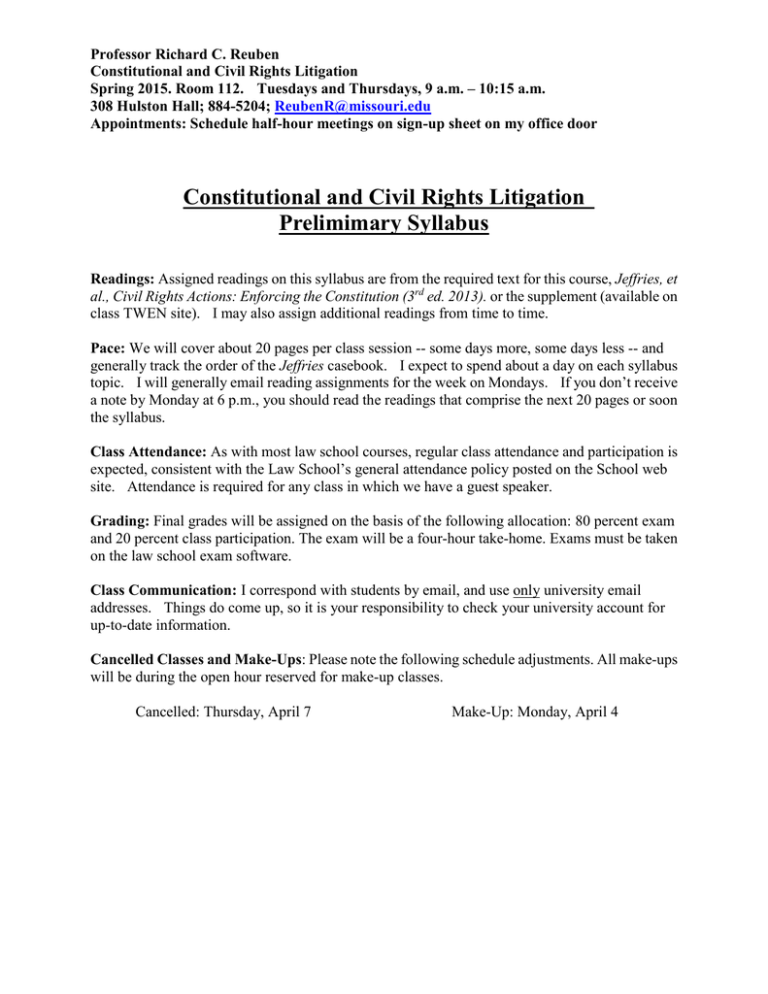
Professor Richard C. Reuben Constitutional and Civil Rights Litigation Spring 2015. Room 112. Tuesdays and Thursdays, 9 a.m. – 10:15 a.m. 308 Hulston Hall; 884-5204; ReubenR@missouri.edu Appointments: Schedule half-hour meetings on sign-up sheet on my office door Constitutional and Civil Rights Litigation Prelimimary Syllabus Readings: Assigned readings on this syllabus are from the required text for this course, Jeffries, et al., Civil Rights Actions: Enforcing the Constitution (3rd ed. 2013). or the supplement (available on class TWEN site). I may also assign additional readings from time to time. Pace: We will cover about 20 pages per class session -- some days more, some days less -- and generally track the order of the Jeffries casebook. I expect to spend about a day on each syllabus topic. I will generally email reading assignments for the week on Mondays. If you don’t receive a note by Monday at 6 p.m., you should read the readings that comprise the next 20 pages or soon the syllabus. Class Attendance: As with most law school courses, regular class attendance and participation is expected, consistent with the Law School’s general attendance policy posted on the School web site. Attendance is required for any class in which we have a guest speaker. Grading: Final grades will be assigned on the basis of the following allocation: 80 percent exam and 20 percent class participation. The exam will be a four-hour take-home. Exams must be taken on the law school exam software. Class Communication: I correspond with students by email, and use only university email addresses. Things do come up, so it is your responsibility to check your university account for up-to-date information. Cancelled Classes and Make-Ups: Please note the following schedule adjustments. All make-ups will be during the open hour reserved for make-up classes. Cancelled: Thursday, April 7 Make-Up: Monday, April 4 Schedule of Classes A. Chapter I. Section 1983 Topic 1: “Under Color of” Law (Monroe) Pages 1-18 Topic 2: Suits Against Federal Officers (Bivens) Pages 18-31 Topic 3: The Eleventh Amendment and State Sovereign Immunity Pages 413-428, 36-41 Topic 4: Official Immunity: Absolute Immunity P ages 42-75 Topic 5: Official Immunity: Qualified Immunity (“Clearly Established Law”) Pages 75-91 Topic 6 Official Immunity: Qualified Immunity (“Reasonableness” of Conduct) Pages 91-121 Topic 7: Governmental Liability (Monell) Pages 148-162 Topic 8: Governmental Liability (Municipalities) Pages 162-184 Topic 9: Governmental Liability (Official Policy or Custom) Pages 184-203 Topic 10: Governmental Liability (Failure to Train) Pages 203-223 Topic 11: Constitutional Rights Enforceable under Section 1983 Pages 223-248 TWEN: DeShaney v. Winnebago County Dep’t of Social Services Topic 12: Enforcing the First Amendment under Section 1983 TWEN: Pleasant Grove City, Utah v. Summum Hastings Christian Fellowship v. Martinez Rosenberger v. Rector & Visitors of the Univ. of Virginia Topic 13: Enforcing the Fourth Amendment under Section 1983: Excessive Force TWEN: Brower v. County of Inyo Graham v. Connor Foster v. Metro Airports Topic 14: Enforcing the Fifth, Sixth and 14th Amendments under Section 1983 TWEN: Chavez v. Martinez (Miranda) Mills v. City of Grand Forks (Due Process) Johnson v. Crooks (Equal Protection) Clark v. Tulare County (Right to Counsel) Topic 15: Constitutional Rights: Section 1983 and State Law Pages 248-270 Topic 16: Non-Constitutional Rights Enforceable under 1983 Pages 271-293 Topic 17: Damages Pages 293-329 B. Chapter 2: Attorney Fees Topic 18: Attorney Fees: Entitlement Pages 329-351 Topic 19: Attorney Fees: Amount Pages 351-369 Topic 20: Attorney Fees: Enhancements Pages 370-394 Topic 21: Attorney Fees: Negotiated Settlements Pages 394-412 C. Other General Civil Rights Provisions Topic 22: Section 1982 Pages 595-615 Topic 23: Section 1981 Pages 616-613-638 Topic 24: Section 1985 Pages 667-690 Topic 25: Title IX Pages 765-783 Topic 26: Title IX Pages 783-810 DISCLOSURES Statement Regarding Americans with Disabilities Act If you anticipate barriers related to the format or requirements of this course, if you have emergency medical information to share with me, or if you need to make arrangements in case the building must be evacuated, please let me know as soon as possible. This sample statement is posted on the web at: http://provost.missouri.edu/faculty/syllabus.html and at http://disabilityservices.missouri.edu/faculty/syllabus.php. If disability-related accommodations are necessary (for example, a note taker, extended time on exams, captioning), please register with the Office of Disability Services (http://disabilityservices.missouri.edu), S5 Memorial Union, 573- 882-4696, and then notify me of your eligibility for reasonable accommodations. For other MU resources for students with disabilities, click on "Disability Resources" on the MU homepage. Statement Regarding Academic Dishonesty Academic integrity is fundamental to the activities and principles of a university. All members of the academic community must be confident that each person's work has been responsibly and honorably acquired, developed, and presented. Any effort to gain an advantage not given to all students is dishonest whether or not the effort is successful. The academic community regards breaches of the academic integrity rules as extremely serious matters. Sanctions for such a breach may include academic sanctions from the instructor, including failing the course for any violation, to disciplinary sanctions ranging from probation to expulsion. When in doubt about plagiarism, paraphrasing, quoting, collaboration, or any other form of cheating, consult the course instructor. Statement Regarding Intellectual Pluralism The Law School community welcomes intellectual diversity and respects student rights. Students who have questions or concerns regarding the atmosphere in this class (including respect for diverse opinions) may contact the Dean’s Office, the Director of the Office of Students Rights and Responsibilities http://osrr.missouri.edu/ or the MU Equity Office (equity@missouri.edu). All students will have the opportunity to submit an anonymous evaluation of the instructor(s) at the end of the course.
